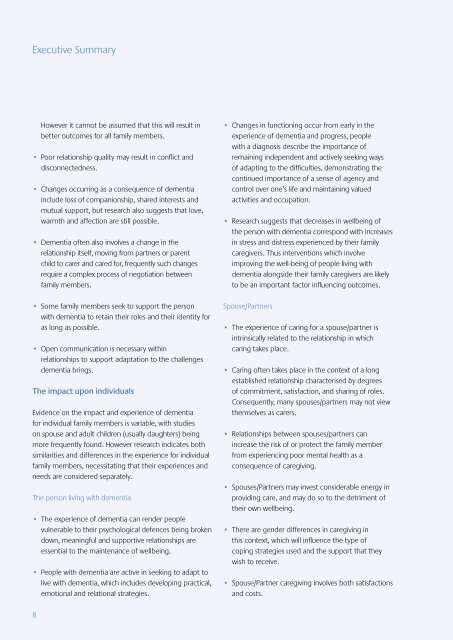The experiences needs and outcomes for carers of people with dementia
RSAS-ADS-Experiences-needs-outcomes-for-carers-of-people-with-dementia-Lit-review-2016
RSAS-ADS-Experiences-needs-outcomes-for-carers-of-people-with-dementia-Lit-review-2016
You also want an ePaper? Increase the reach of your titles
YUMPU automatically turns print PDFs into web optimized ePapers that Google loves.
Executive Summary<br />
However it cannot be assumed that this will result in<br />
better <strong>outcomes</strong> <strong>for</strong> all family members.<br />
• Poor relationship quality may result in conflict <strong>and</strong><br />
disconnectedness.<br />
• Changes occurring as a consequence <strong>of</strong> <strong>dementia</strong><br />
include loss <strong>of</strong> companionship, shared interests <strong>and</strong><br />
mutual support, but research also suggests that love,<br />
warmth <strong>and</strong> affection are still possible.<br />
• Dementia <strong>of</strong>ten also involves a change in the<br />
relationship itself, moving from partners or parent<br />
child to carer <strong>and</strong> cared <strong>for</strong>, frequently such changes<br />
require a complex process <strong>of</strong> negotiation between<br />
family members.<br />
• Some family members seek to support the person<br />
<strong>with</strong> <strong>dementia</strong> to retain their roles <strong>and</strong> their identity <strong>for</strong><br />
as long as possible.<br />
• Open communication is necessary <strong>with</strong>in<br />
relationships to support adaptation to the challenges<br />
<strong>dementia</strong> brings.<br />
<strong>The</strong> impact upon individuals<br />
Evidence on the impact <strong>and</strong> experience <strong>of</strong> <strong>dementia</strong><br />
<strong>for</strong> individual family members is variable, <strong>with</strong> studies<br />
on spouse <strong>and</strong> adult children (usually daughters) being<br />
more frequently found. However research indicates both<br />
similarities <strong>and</strong> differences in the experience <strong>for</strong> individual<br />
family members, necessitating that their <strong>experiences</strong> <strong>and</strong><br />
<strong>needs</strong> are considered separately.<br />
<strong>The</strong> person living <strong>with</strong> <strong>dementia</strong><br />
• <strong>The</strong> experience <strong>of</strong> <strong>dementia</strong> can render <strong>people</strong><br />
vulnerable to their psychological defences being broken<br />
down, meaningful <strong>and</strong> supportive relationships are<br />
essential to the maintenance <strong>of</strong> wellbeing.<br />
• People <strong>with</strong> <strong>dementia</strong> are active in seeking to adapt to<br />
live <strong>with</strong> <strong>dementia</strong>, which includes developing practical,<br />
emotional <strong>and</strong> relational strategies.<br />
• Changes in functioning occur from early in the<br />
experience <strong>of</strong> <strong>dementia</strong> <strong>and</strong> progress, <strong>people</strong><br />
<strong>with</strong> a diagnosis describe the importance <strong>of</strong><br />
remaining independent <strong>and</strong> actively seeking ways<br />
<strong>of</strong> adapting to the difficulties, demonstrating the<br />
continued importance <strong>of</strong> a sense <strong>of</strong> agency <strong>and</strong><br />
control over one’s life <strong>and</strong> maintaining valued<br />
activities <strong>and</strong> occupation.<br />
• Research suggests that decreases in wellbeing <strong>of</strong><br />
the person <strong>with</strong> <strong>dementia</strong> correspond <strong>with</strong> increases<br />
in stress <strong>and</strong> distress experienced by their family<br />
caregivers. Thus interventions which involve<br />
improving the well-being <strong>of</strong> <strong>people</strong> living <strong>with</strong><br />
<strong>dementia</strong> alongside their family caregivers are likely<br />
to be an important factor influencing <strong>outcomes</strong>.<br />
Spouse/Partners<br />
• <strong>The</strong> experience <strong>of</strong> caring <strong>for</strong> a spouse/partner is<br />
intrinsically related to the relationship in which<br />
caring takes place.<br />
• Caring <strong>of</strong>ten takes place in the context <strong>of</strong> a long<br />
established relationship characterised by degrees<br />
<strong>of</strong> commitment, satisfaction, <strong>and</strong> sharing <strong>of</strong> roles.<br />
Consequently, many spouses/partners may not view<br />
themselves as <strong>carers</strong>.<br />
• Relationships between spouses/partners can<br />
increase the risk <strong>of</strong> or protect the family member<br />
from experiencing poor mental health as a<br />
consequence <strong>of</strong> caregiving.<br />
• Spouses/Partners may invest considerable energy in<br />
providing care, <strong>and</strong> may do so to the detriment <strong>of</strong><br />
their own wellbeing.<br />
• <strong>The</strong>re are gender differences in caregiving in<br />
this context, which will influence the type <strong>of</strong><br />
coping strategies used <strong>and</strong> the support that they<br />
wish to receive.<br />
• Spouse/Partner caregiving involves both satisfactions<br />
<strong>and</strong> costs.<br />
8


